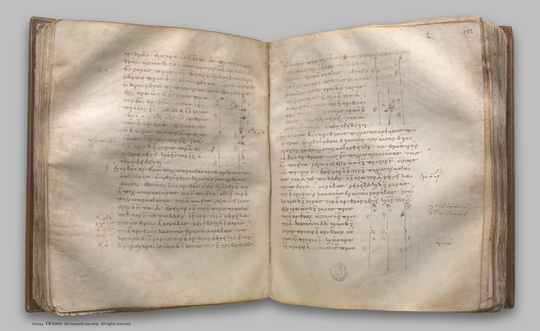index prev next | digilib folio 136

If a number by multiplying two numbers make certain numbers, the numbers so produced will have the same ratio as the numbers multiplied.
| Ἐὰν ἀριθμὸς δύο ἀριθμοὺς πολλαπλασιάσας ποιῇ τινας, οἱ γενόμενοι ἐξ αὐτῶν τὸν αὐτὸν ἕξουσι λόγον τοῖς πολλαπλασιασθεῖσιν. Ἀριθμὸς γὰρ ὁ Α δύο ἀριθμοὺς τοὺς Β, Γ πολλαπλασιάσας τοὺς Δ, Ε ποιείτω: λέγω, ὅτι ἐστὶν ὡς ὁ Β πρὸς τὸν Γ, οὕτως ὁ Δ πρὸς τὸν Ε. Ἐπεὶ γὰρ ὁ Α τὸν Β πολλαπλασιάσας τὸν Δ πεποίηκεν, ὁ Β ἄρα τὸν Δ μετρεῖ κατὰ τὰς ἐν τῷ Α μονάδας. μετρεῖ δὲ καὶ ἡ Ζ μονὰς τὸν Α ἀριθμὸν κατὰ τὰς ἐν αὐτῷ μονάδας: ἰσάκις ἄρα ἡ Ζ μονὰς τὸν Α ἀριθμὸν μετρεῖ καὶ ὁ Β τὸν Δ. ἔστιν ἄρα ὡς ἡ Ζ μονὰς πρὸς τὸν Α ἀριθμόν, οὕτως ὁ Β πρὸς τὸν Δ. διὰ τὰ αὐτὰ δὴ καὶ ὡς ἡ Ζ μονὰς πρὸς τὸν Α ἀριθμόν, οὕτως ὁ Γ πρὸς τὸν Ε: καὶ ὡς ἄρα ὁ Β πρὸς τὸν Δ, οὕτως ὁ Γ πρὸς τὸν Ε. ἐναλλὰξ ἄρα ἐστὶν ὡς ὁ Β πρὸς τὸν Γ, οὕτως ὁ Δ πρὸς τὸν Ε: ὅπερ ἔδει δεῖξαι. | If a number by multiplying two numbers make certain numbers, the numbers so produced will have the same ratio as the numbers multiplied. For let the number A by multiplying the two numbers B, C make D, E; I say that, as B is to C, so is D to E. For, since A by multiplying B has made D, therefore B measures D according to the units in A. But the unit F also measures the number A according to the units in it; therefore the unit F measures the number A the same number of times that B measures D. Therefore, as the unit F is to the number A, so is B to D. [VII. Def. 20] For the same reason, as the unit F is to the number A, so also is C to E; therefore also, as B is to D, so is C to E. |